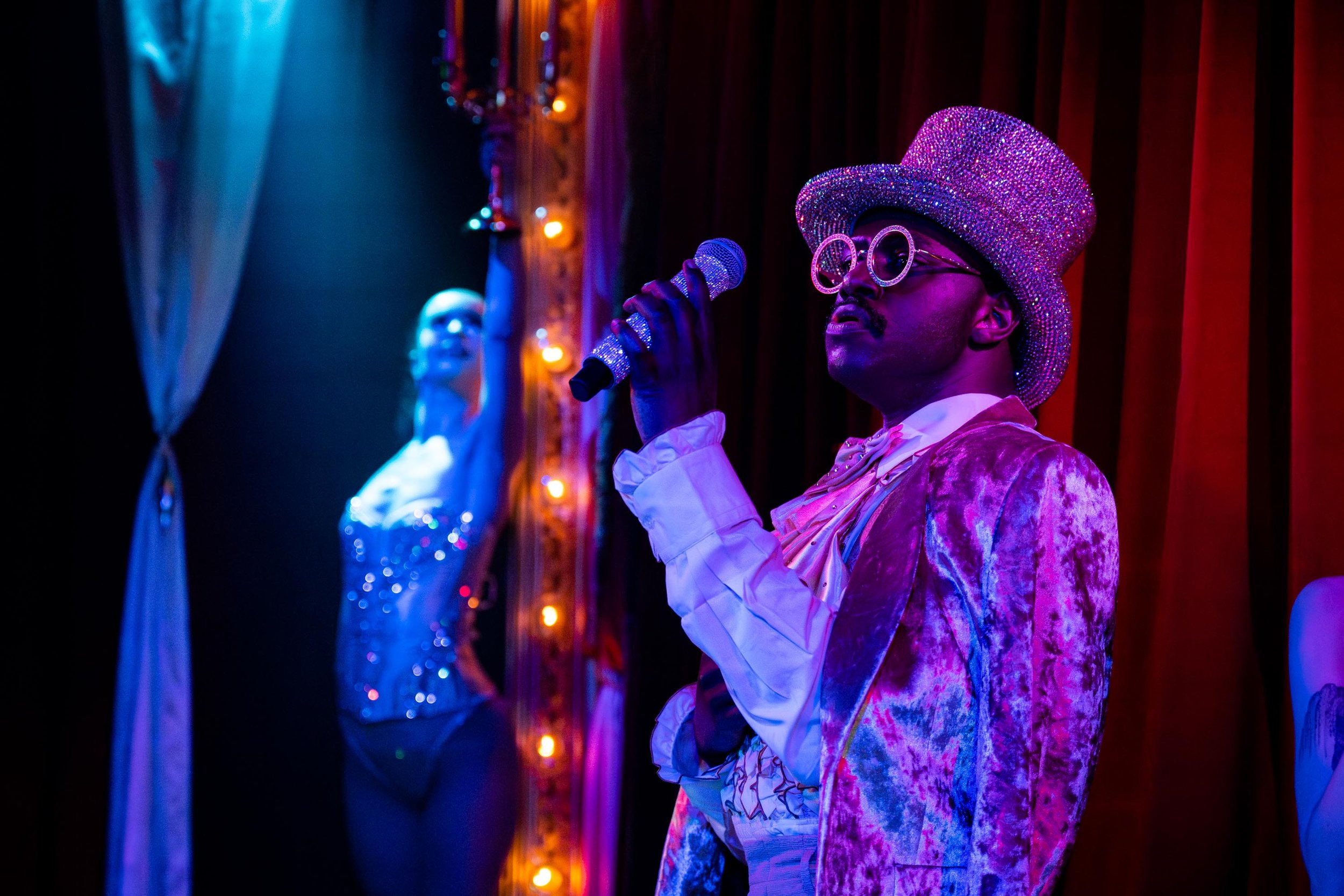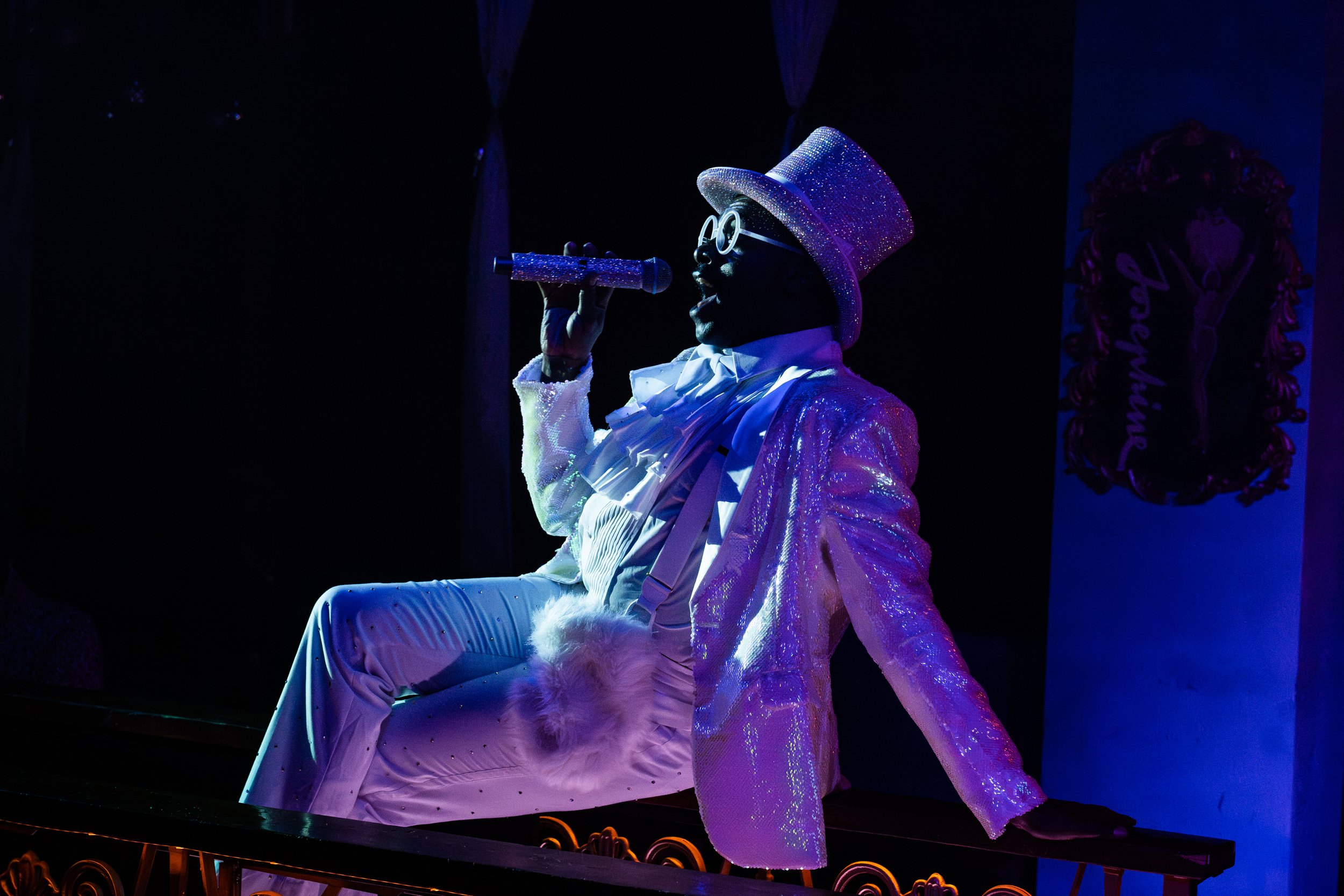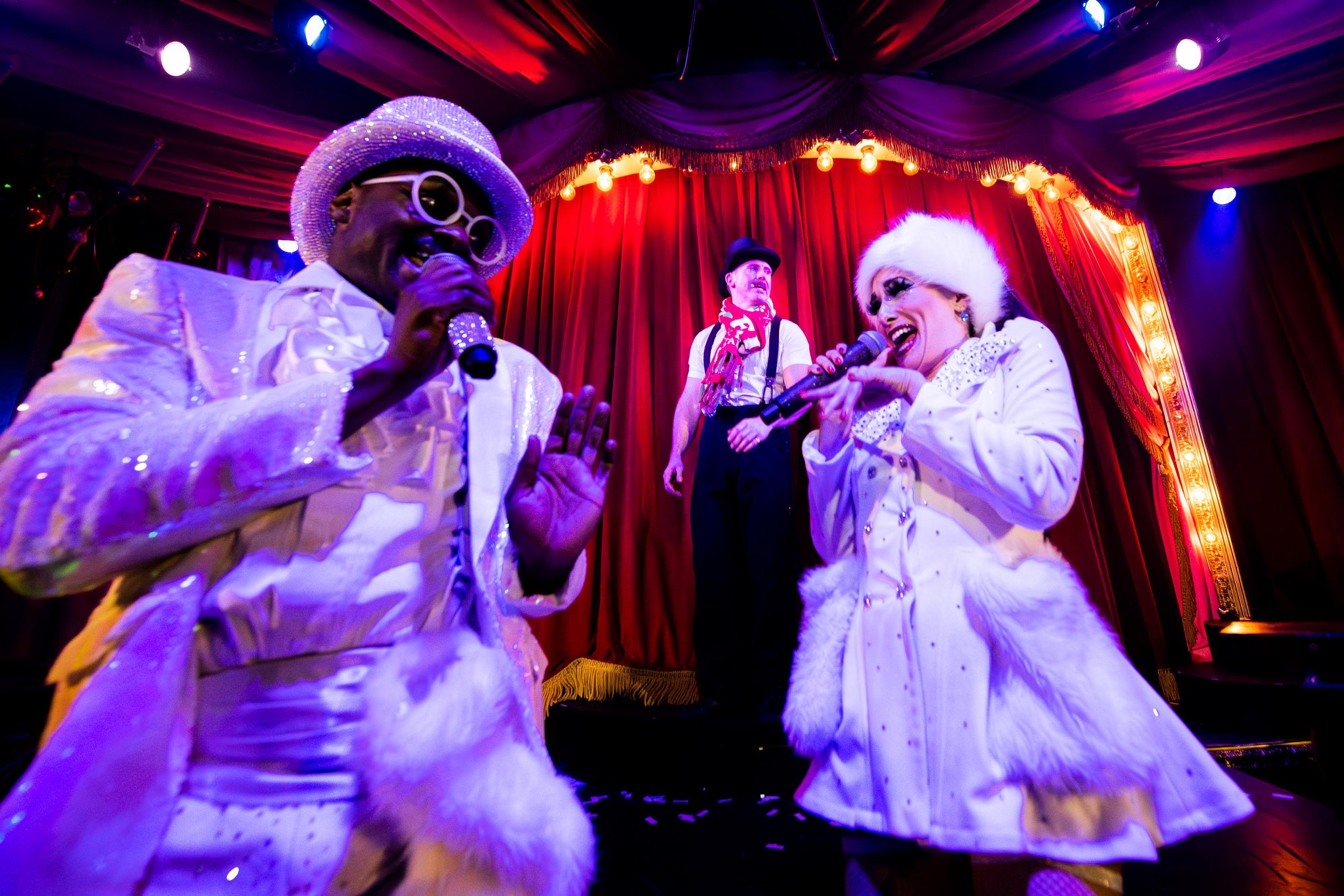A Diamond in Seattle’s Theatre Scene with Nicholas Japaul Bernard
In the vibrant world of Seattle's performing arts scene, actor Nicholas Japaul Bernard has carved a niche for himself as a dynamic, multifaceted talent–and has recently added Can Can to his impressive resume of stages.
From an early background that saw him trading track shoes for the spotlight, Nicholas emerged from the East Coast to the PNW not only as a cancer survivor but as a creative triple threat. As he reflects on his artistic evolution, the actor sheds light on the pivotal role comedy played as a savior during challenging times and how he has recently discovered the unstoppable power of his own voice. (If you’ve seen Wonderland this year, you know exactly what voice we’re talking about. If you haven’t yet–well, grab some tissues ‘cause you’re gonna need ‘em.)
In this exclusive Can Can interview, we delve into the fascinating journey of this versatile performer, exploring the roots of his creativity and what makes theatre in this town just so damn special.
THECANCAN.COM: Welcome to the Can Can stage! Can you share about your journey as a performer up until this point?
Nicholas Japaul Bernard: I technically started theater in middle school when my best friend and I did a production of Fiddler on the Roof to satisfy our music credit requirement. In my freshman year of high school, I was on the track team. The theatre department, to my interest, was doing Les Mis and they needed boys, so I went and auditioned. I ended up getting a lead as Javert. I remember on opening night I had finished his big solo, and the audience was applauding. I was like, “Oh sh-t, I could get used to this. I like this a lot.”
I started dancing my senior year of high school and fell in love with it. I ended up going to SUNY Fredonia for dance, and the plan was to be an ensemble dancer, maybe dance for a company here or there. After I graduated, however, I ended up having a run-in with cancer. After some complications with the surgery, I lost the ability to dance in the way that I had been. That’s why I wear braces now because I have some paralysis in my legs these days. So, I spent about two years healing, in and out of the hospital with surgeries, in Rochester, my hometown, healing up. This all happened when I was 24. Once I was ready, I started acting again.
I ended up meeting Jay O'Leary Woods, the Associate Artistic Director at 5th Ave, doing a community theater show back in Rochester. She moved to Seattle to do the Intiman Theatre’s emerging artist program. I was doing a play in Buffalo, New York, and she messaged me and was like, “You should audition for this!” I applied for the 2017 cohort, which was being headed by Sarah Porkalob at the time, and got an audition. My mom works for Delta, which means I fly for peanuts. So, I flew to Seattle, stayed with Jay, auditioned for the program, and got in.
I moved here on Juneteenth in 2017 and did the program, which was, for all intents and purposes, like a senior showcase. We all made our solo shows, and then they invited anybody who was anybody in the theater community to come and watch the showcase. At that time, the Associate Artistic Director for 5th Ave was Kelsey Thorgalsen. She happened to be there and after called me in for an audition and got my name in the system. I started doing Gala gigs and workshops for 5th. Shortly after that, Mat Wright from Artswest called me in to audition for Kiss of the Spider Woman, which I was going to be in but they ended up switching gears and offered me Hedwig and the Angry Inch. It was during rehearsals for this that Kelsey got in contact with me and offered me ensemble tracks for Annie and Rock of Ages for the 2018 season. Everything took off from there.
THECANCAN.COM: We LOVED your Visit Seattle tour around Seattle's theatre scene with your bestie. Can you tell us a bit more about what it's like being a creative triple threat (actor, singer, writer) in a city like Seattle?
Nicholas Japaul Bernard: Speaking from my own experience, Seattle is a great city for the girls who want to do a little bit of everything because there's a chance to do a little bit of everything. I don't know many people in this city who are not multi-hyphenates.
Sarah Porkalob is probably one of the most famous examples. She’s obviously a dynamo singer and a sickening actress, but she’s also a phenomenal writer. She created The Dragon Cycle and parlayed the success of that into her Broadway debut last year. She then parlayed that success back into The Dragon Cycle, which she continues to perform from coast to coast. And that’s kind of what the journey is. When you can take all of your talents, focus them on a specific art form, and use your talents to fill out as much of that art form as possible–Seattle really provides a space for that. There's so much new work being made here. There are so many new plays, festivals, and residencies happening in this city at any given moment.
Seattle has just allowed me to flourish in all of my different artistic capacities, and I don't necessarily think that I would be able to do all the things that I've done in the way that I've done them if I had been anywhere else.
THECANCAN.COM: Your character in Wonderland has the entire theatre aching with laughter by the end of the show. Where did you get your funny bone and what keeps it sharp? (In other words, what inspires you comedically?)
Nicholas Japaul Bernard: In terms of holding a room, I grew up watching my mom do just that. She had aspirations to be a singer, but it was a different time; she had a family and life did not necessarily pan out that way. She's very happy with the life that she has, but it was very clear watching her sing in church that I got my voice from her.
I picked up very quickly how everyone gravitated toward her and circled around her whenever she was in a room. I spent a lot of my childhood, adolescence, and, honestly, still my adulthood cultivating that and making that a big part of my personality. In terms of comedy, it all stems from that.
People often ask me why I’m so funny. In rehearsal, Chris was like, “I just love that you can come up with a punch line or a joke so quickly on the spot.” And I was like, “It comes from trauma.” I was only half kidding because being funny did start out as a defense mechanism. Part of being funny is being very quick and smart. That listening muscle that you need just for acting had already been strengthening when I was a kid as a means to not get bullied. If I was the funny one, nobody would mess with me. Once I started holding court in elementary school and started being able to string words together and talk faster and think quicker than everybody else, the bullying subsided. Suddenly, I was popular, and that lasted through high school.
In terms of inspiration, definitely Tiffany New York Pollard. Definitely Azalea Banks. Kid Fury on the podcast, The Read, was a huge influence on me. As a child, I used to love the movie The Queens of Comedy. Monique was a very big inspiration for me, and all the ways in which Black women have molded me, molded my queerness, and molded my tongue. The way that my mouth works comes from them. It's a mixture of trauma and reverence for Black femininity.
THECANCAN.COM: Not only are you hilarious, but you have the voice of an angel. Which is your favorite song to perform in Wonderland?
Nicholas Japaul Bernard: When I can remember the words, probably “Hallelujah.” Nicholas laughs. Because it's so simple, it is rife with opportunities to just really sing it however you want to. As I have been developing my voice over the years, it's only been in the last couple of years that I have developed some sort of confidence in ad-libbing.
Part of that was coming into contact with Nathaniel Tennenbaum, who's another actor in town. Supreme vocalist. If you ask him, he'll say he grew up listening to Rochelle Rack and was like, “I need to go note for note with this b—h.” So, he just sat there and replayed her and other singers over and over again and meticulously tried to learn every inflection they did.
As a child, I’d listen to people like Norm Lewis, Brian Stokes Mitchell, Heather Headley, and a lot of Whitney Houston. But, I was more so studying for tone back then. So, the actual sound or color of my voice, the colors that I like to use, come from that. It wasn't until the last five years of dealing with Nathaniel and then becoming friends with the Choir Boy cast and all of us getting together, listening to each other, and having to sing a cappella all the time that my ear just started to get trained. It's still not quite where I want it to be. There's always more improvement for me. There are always new notes and inflections and intervals to hear. There is always more agility that can be had with the voice, but I'm now more comfortable with just trying things, making things up, and just letting my voice do what it does.
“Hallelujah” is the same melody every single time, and I’m just kind of choosing things and throwing things in here and seeing what this is, and that's just become a part of my singing journey. I also get to sit down during the song, so I don't have to dance or run around the catwalk and do it. I can just sit on my ass and just sing for a little bit…when I remember the words. G–damn it. Those lyrics. Every verse can be any other verse. It’s like I've made a quilt out of that song. It's ridiculous. And then when you look at it online, there's hella versions! There are like 20 different verses and everybody does them in different order. So I’m like, “What the f–k?” But it's a beautiful song. Nicholas laughs.
THECANCAN.COM: Now that you've traveled to Wonderland and back more times than you can probably count, how would you describe what this Can Can show represents for folks (and yourself!) around the holiday season?
Nicholas Japaul Bernard: Wonderland really speaks to Can Can as a whole. I was talking to Shadou about this, and I said, “It's really fun to come in and work with crazy talented artists for the sake of just making something beautiful.”
I believe that art should be moving the needle as much as possible, specifically in theater spaces, and we are doing solid musical theater. Can Can is more of a burlesque cabaret presentational situation. It's in this nice space where we can throw all of our artistic energy at it, but we're really just here to make something stunning and that's it. And I think that's important.
I just got done doing a staged reading with the Williams Project of this mash-up of an Oscar Wilde play, the Three Trials of Oscar Wilde. And something that Oscar always talked about is how art is about beauty, and hearing those words for like two weeks straight struck something with me. So, when I got the email from Shadou asking, “Do you wanna do a show?” I had another gig, and I moved it. Nicholas laughs. Because after hearing “art is about beauty,” I was like, “Yeah, that's right.” It's been so long since I've done something that truly felt like beauty was at the forefront.
In a lot of shows, beauty just kind of happens. It's a by-product of everyone focusing on something else. I've done pretty theater here. I've done beautiful theater here, but this is my first time doing a show where beauty was at the forefront. We are drawing a very beautiful picture. That's what it is, and that's what it stands for. And here's some Christmas on it, and I'm obsessed. So, I think for me and for Seattle, Wonderland represents the power of beauty for beauty’s sake.
When I've talked to my friends who've come to see the show–my friends who've done theater all around this town, my friends from the biggest theaters to the smallest theaters–they've never been so emotionally affected by a show until they saw Wonderland. They were sitting in their seats sobbing, but there's no one dying on stage, we're not talking about the plight of insert-marginalized-person; it's just beautiful. It is always important for art to say something. It is always important for art to be progressive and move the needle, whether it's in casting or subject matter or who's working on the show. Yes, we're always moving towards a more equitable and sustainable artistic process. However, if it's not beautiful, it doesn't mean anything. It doesn't because it's not going to affect anyone.






